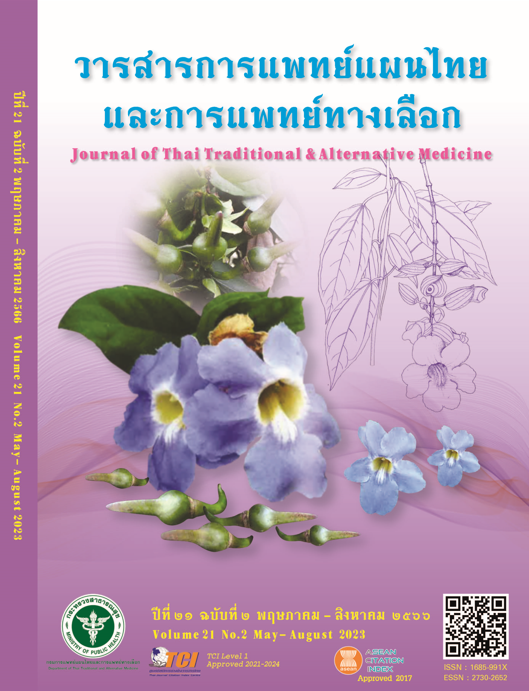Service Management of Medical Cannabis Clinics and Cannabis Product Prescription at Government Hospitals in Nan Province
Main Article Content
Abstract
Introduction and objective: The medical use of cannabis extract is increasingly accepted. In Thailand, the Ministry of Public Health recognizes the benefits of medical cannabis products and supports efficient public access by establishing more medical cannabis clinics in government hospitals. However, the current situations of such clinics at state hospitals fall short of the intended coverage, possibly due to various related factors. Therefore, this study aimed to investigate the clinic management and prescription of medical cannabis products in government hospitals in Nan province and identify factors associated with clinic establishment.
Methods: This cross-sectional descriptive research used a purposive sampling method to select a sample of 80 medical personnel in 15 government hospitals in the province. Data were collected using a questionnaire from October 15, 2021, to March 30, 2022, and analyzed using Pearson correlation and Fisher's exact test.
Results: Of all 80 participants, 73.8% were ready to establish medical cannabis clinics and 77.5% had positive attitudes towards providing such services. Of all the 15 hospitals, 78.5% (1 general and 11 community hospitals) had established such clinics, but 23.8% were not actively providing cannabis products due to limited resources, especially personnel. Significant correlations were found between age and work duration with attitudes (p < 0.05) and overall attitudes towards overall clinic management (p < 0.05); and between attitudes on health/medical cannabis system development and clinic establishment (p < 0.01). However, the level of knowledge of participants was only moderate and was not significantly related to the prescription of cannabis products.
Discussion: Based on the findings mentioned above, general hospitals serving as medical hubs were better equipped and more prepared to establish and provide medical cannabis clinics or services compared to community hospitals, mainly due to resource limitations, especially in terms of personnel. Although a majority of participants (95.0%) were aware of the policy objectives for setting up medical cannabis clinics and the societal awareness of cannabis treatment, there were still limitations in the knowledge and prescription practices among physicians. These limitations were influenced by their limited experience, the early stage of clinic establishment, and the insufficient capacity of the service system, resulting in a small number of patients seeking medical cannabis treatment and inadequate empirical evidence. These factors affected physicians' decisions to prescribe cannabis products.
Conclusion: To support the establishment and effective operations of medical cannabis clinics, there is a need to develop positive attitudes and perspectives towards cannabis treatment. Additionally, there should be efforts to develop medical cannabis clinics by implementing a comprehensive health service plan. The implementation will help create a clear direction and objectives for the effective functioning of such clinics. Furthermore, it is essential to conduct clinical research on the effectiveness of medical cannabis products as evidence-based practices, which will contribute to building confidence in the products for treating patients.
Article Details

This work is licensed under a Creative Commons Attribution-NonCommercial-NoDerivatives 4.0 International License.
References
Prosk E, Arboleda MF, Rapin L, Hage CEl, & Dworkind M. The model of care at a leading medical cannabis clinic in Canada. Complementary Therapies in Medicine. 2021;102740(60):1-8.
Abrams DI. The therapeutic effects of cannabis and cannabinoids: An update from the National Academies of Sciences, Engineering, and Medicine report. European Journal of Internal Medicine. 2018;49:7-11.
Institute of Medical Research a Technology Assessment, Department of Medical Services. Guidance on Cannabis for Medical Use. Nonthaburi: Institute of Medical Research a Technology Assessment; 2020. (in Thai)
Announcement of the Ministry of Public Health: Designate practitioners of Thai traditional medicine and folk healers according to the law on professional Thai traditional medicine that can cook or prescribe prescriptions containing cannabis concoctions B.E. 2562 (2019). Published in Government Gazette, Vol. 136, Part 94d. (2019 April 11). (in Thai)
Sawetprawichkun W. Value chain management for medical cannabis in Thailand B.E. 2564. Teaching documents. [Internet]. 2019 [cited 2022 Jun 19]; Available from: http://e-learning-dmta.dms.go.th/mod/page/view.php?id=296
Haug NA, Kieschnick D, Sottile JE, Babson KA, Vandrey R, Bonn-Miller MO. Training and practices of cannabis dispensary staff. Cannabis Cannabinoid Res. 2016;1(1):244–51.
Abuhasira R, Shbiro L, Landschaft Y. Medical use of cannabis and cannabinoids containing products - regulations in Europe and North America. European Journal of Internal Medicine. 2018;49:2-6.
Nan Provincial Public Health Office. Information of personnel in medical cannabis clinics, Nan Province. Nan: Nan Provincial Public Health Office; 2021. (in Thai)
Pasunon P. Approach in quantitative research. The Journal of Faculty of Applied Arts, King Mongkut's University of Technology North Bangkok. 2014;7(2):112-20. (in Thai)
Lueangchiranothai P, Palawong S, Kamol T. Effectiveness of cannabis extract at medical cannabis clinic in Lampang Hospital. Journal of Thai Traditional & Alternative Medicine. 2021;19(1):19-33. (in Thai)
Department of Medicine Services, Ministry of Public Health. Clinical model giving consultation on the use of medical cannabis. 1st ed. Nonthaburi: The War Veterans Organization's printing; 2019. 50 p. (in Thai)
Corroon Jr JM, Mischley LK, Sexton M. Cannabis as a substitute for prescription drugs – a cross-sectional study. Journal of Pain Research. 2017;10:989–98.
Assanangkornchai S, Thaikla K, Talek M, Saingam D. Project: A study of the current situation of medical cannabis use in Thailand. Research Report. Health Systems Research Institute.[Internet]. 2021 [cited 2022 Jun 10]; Available from: https://kb.hsri.or.th/dspace/handle/11228/5346?locale-attribute=th


